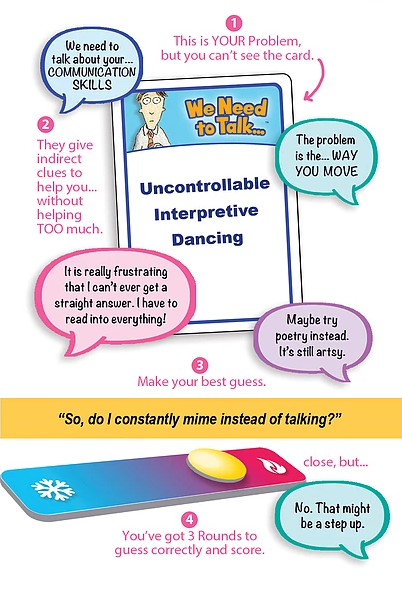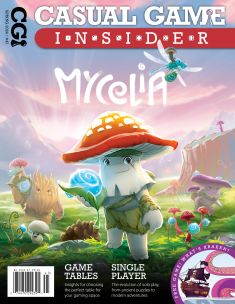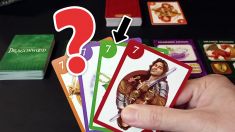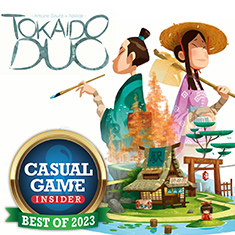We Need to Talk...A Party Game of Wacky Interventions

You have a most peculiar problem. Your loved ones want you to stop. But no one exactly wants to put it into words!
Will your clues be too obvious and lose you points? Or too obscure and leave the guesser in the dark? It’s not always easy to strike the perfect balance.
Gameplay
We Need to Talk… is played over a series of rounds. Each round, a different player is the 'intervened' (the one with the problem), while everyone else are the 'concerned friends.' The game ends once everyone has been the 'intervened' once, and the player with the highest score wins the game.
At the beginning of the round, the concerned friends draw and look at one of the problem cards. The problems are designed to be weird and wacky. For example, 'uncontrollable interpretive dancing.'
Each round is broken into three phases. During the first phase, each concerned friend gives a clue as to the subject of the problem. You can flavor it with things like 'we need to talk about…' or 'we're here because of…' but you can only use one or two words to describe the issue. Next is the 'emotional appeal' phase, where players use one or more sentences to describe how the problem makes them feel. During the third phase, players take turns suggesting a solution to the problem.
For clues to be valid they cannot use any words that appear on the problem card in question, and must be significantly different from previous clues given. Players can also choose to pass on their turn if they cannot think of a valid clue.
At the start of each round, the intervened takes a number of point tokens (which varies based on player count). After a player gives a valid clue, the intervened gives them a clue token. After each clue the intervened may also attempt to guess the problem. If he decides to guess, he gives another clue token to the player who just gave a clue and then announces the guess. If his guess is correct, the player who gave the most recent clue loses all her point tokens, the round ends, and the intervened keeps all the point tokens he still has. If the guess is incorrect, the concerned friends can decide to use a hot and cold scale provided in the game to indicate how close the guess was.
After all clues have been given, if the problem has still not been guessed, the intervened gets one final guess. If it is correct, he takes one point token back from each player. If he is incorrect, no one earns any points that round. Point tokens are worth two points each for concerned friends at the end of a round and one point for the intervened. Players make note of the scores and then set up the game for a new round.

Review
We Need to Talk… is a fun party game full of funny moments and creativity. The problems included in the game are wide ranging and often bizarre, and players can also easily come up with their own if they choose.
The scoring system is clever, keeps the game balanced, and ensures that clue giving is challenging. It’s tricky to both lead the guesser in the right direction but not so quickly that you lose all your points. You’re both working with the other players to help get the intervened to guess, but trying to ensure it’s someone else who loses their points. The guesser is also incentivized to guess early but not to waste guesses or guess too often.
There’s a lot of a moments to get silly during the game — when players really embrace the intervention theme and play up their parts is when the game is the most funny and enjoyable.
When playing with seven or eight players, each concerned friend does not give clues every phase of the round, but only during two of the three phases. This does mean there’s more downtime and you don’t feel quite as involved in the game.
An enjoyable party game, We Need to Talk… is light but engaging and offers a great time. None of the cards ever go beyond a PG rating, but the theme and mechanics are likely to appeal more to an older audience. The clues make you think and the game makes you laugh: a perfect combination for a party game.
Pros: Clever scoring mechanic, fun problem card, even better when you embrace the theme
Cons: The workaround for seven or eight players is not ideal
Disclosure: we received a complimentary review copy of this game.











